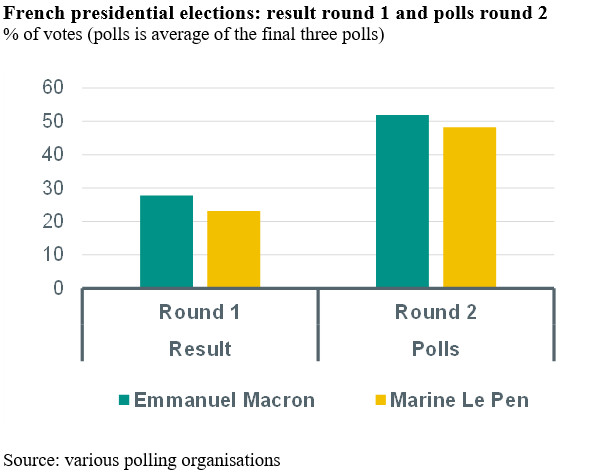Macron likely to continue presidency for five more years


The results for the first round of the French presidential elections show that Emmanuel Macron (centre/centre-right) and Marine le Pen (far-right) will contest the second round of the elections on 24 April. With all votes counted, Macron (27.8%) ended up well ahead of Le Pen (23.1%). Indeed, Macron’s lead over Le Pen was wider than during the first round of the elections in 2017. The polls for the second round put Le Pen much closer to Macron than five years ago. Therefore, it has become more important whether the candidates that did not make it to the second round will instruct their supporters to switch to either Macron or Le Pen. When we add these voting intentions and advices of the other candidates to the polls, it seems that the gap between Macron and Le Pen for round two will widen in the next two weeks. The debate between the two candidates on 20 April, will also be a decisive moment, but we do not think that this will change the prospects of Emmanuel Macron continuing his presidency for another five years.
Macron wins the first round with a bigger lead than in 2017
The results for the first round of the French presidential elections show that Emmanuel Macron (centre/centre-right) and Marine le Pen (far-right) will contest the second round of the elections on 24 April. With all votes counted, Macron (27.8%) ended up well ahead of Le Pen (23.1%). Indeed, Macron’s lead over Le Pen was wider than during the first round of the elections in 2017, when the gap between the two candidates was only 2.7 percentage points. Jean-Luc Mélenchon (far-left) ended up third and rather close to Le Pen, gaining 22% of the votes.
Polls for round two are closer
Whereas the results of the first round of voting give a bigger lead to Macron than in 2017, the polls for the second round put Le Pen much closer to Macron than five years ago. In 2017, Macron received 66.1% of the votes in the second round, but the most recent polls indicate he would get only 52% this time. Therefore, it has become more important whether the candidates that did not make it to the second round will instruct their supporters to switch to either Macron or Le Pen.
After the results of the first round, all participants have given speeches to comment on the results, their political engagement and, most importantly, whether they supported Macron or Le Pen. Four candidates (centre-right/far-left/left/green) have mentioned they intend to vote for Macron, advising their supporters to do the same. Their total share of votes in the first round was 13.5%. Two other candidates (far-right/nationalist-conservative), who received a total of 9.2% of the votes during the first round, have advised to vote for Le Pen. The most important candidate Jean-Luc Mélenchon (22% of the votes in the first round) did not give very clear guidance, only repeating to ‘not give one single vote to Marine Le Pen’. He did not endorse Macron, but rather gave his voters the option to either abstain, vote blank or vote for Macron. Considering the political programme of Mélenchon, it is likely that part of his electorate shifts to Le Pen, while some of his centre-left supporters will switch to Macron. However, it seems that a large part of his supporters will abstain or vote blank in the second round.
Based on the polls and the voting intentions and advices of the other candidates it seems that the gap between Macron and Le Pen for round two will widen in the next two weeks. The debate between the two candidates on 20 April, will also be a decisive moment, but we do not think that this will change the prospects of Emmanuel Macron continuing his presidency for another five years. A more extensive note on the elections and the policy plans of the main candidates .
